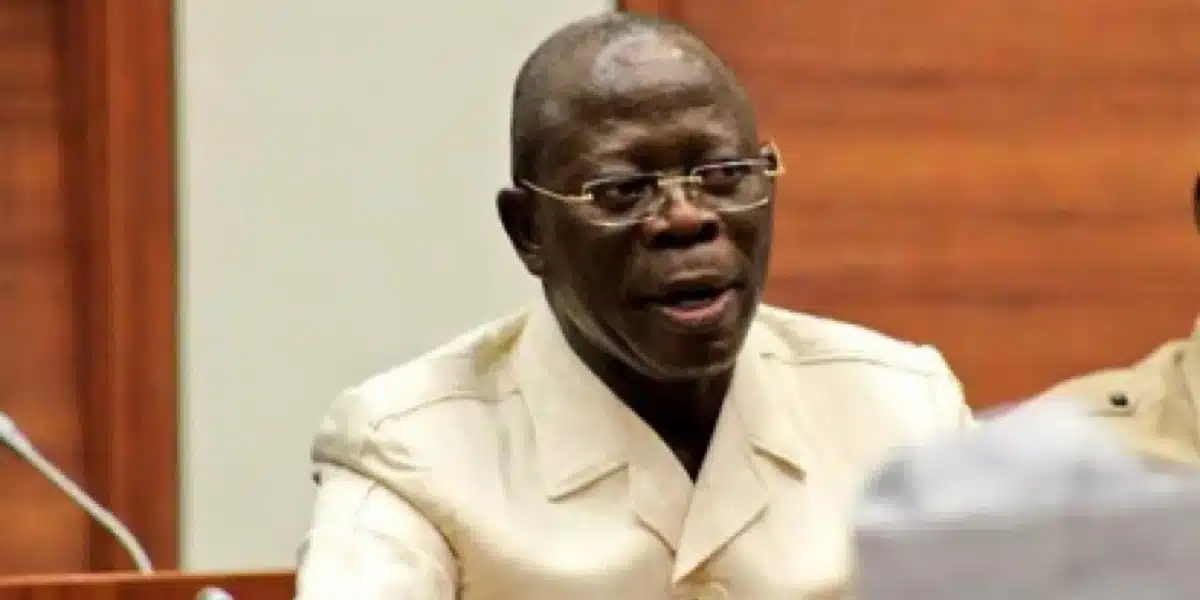Adams Oshiomhole, the former governor of Edo State and prominent labour leader, has voiced strong criticism regarding wage exploitation in Nigeria, stating that workers are now power despite the increment of Minimum Wage by Federal Government.
He warned that inadequate compensation for workers not only undermines their livelihoods but also poses significant risks to national security and economic productivity.
Oshiomhole emphasized that when workers are not fairly compensated, it can lead to increased discontent and unrest, which may destabilize the country.
He called for urgent reforms to address wage disparities and ensure that all workers receive fair pay for their contributions. According to him, improving compensation is essential for fostering a more productive workforce and enhancing the overall stability of the nation.
Speaking at the Distinguished Personality Lecture organized by the National Institute for Security Studies (NISS) in Abuja on Wednesday, he emphasized that inadequate wages perpetuate a cycle of economic hardship, rendering workers susceptible to manipulation and radicalization.
He pointed out that when individuals struggle to meet their basic needs, they become more vulnerable to extremist ideologies and exploitation, which can have dire consequences for national security.
The lecture, titled ‘National Minimum Wage: Reward System and Productivity in Africa,’ was part of the Executive Intelligence Management Course (EIMC) 17, aimed at fostering a deeper understanding of the relationship between wages, security, and productivity
Oshiomhole argued that fair wages are essential for boosting worker motivation, efficiency, and overall economic growth. He emphasized that while some private sector employers offer better wages than the government, job security remains an issue, as private sector employees can be easily dismissed.
According to him, public sector jobs, though offering more stability, are plagued by inefficiency and overemployment, leading to unsustainable compensation structures.
Drawing from his personal experiences as a factory worker and union leader, Oshiomhole underscored the historical struggle between labour and market forces, noting that trade unions and collective bargaining rights were hard-won victories.
He warned that in regions with high unemployment, workers remain trapped in exploitative conditions, as employers exploit the abundance of job seekers.
He stressed that the minimum wage, though intended to protect vulnerable workers, often fails to meet the rising cost of living, leaving many workers poorer over time.
Comparing Nigeria’s wage structure to other African countries, Oshiomhole highlighted the stark disparity, noting that minimum wages in nations like Seychelles and South Africa are significantly higher....Read Full Article [Click Here>]
Oshiomhole also linked poor wages to the rise in migration, pointing out that many Nigerians, including unskilled workers, are drawn to countries like the U.S. and Canada, where higher wages enhance quality of life. He argued that inadequate pay limits workers’ purchasing power, creating a vicious economic cycle that stifles demand and growth.
The Senator, representing Edo North District in the National Assembly, said: “Workers face fluctuating salaries and job insecurity, as employers can easily hire and fire employees.
“Despite paying union dues, workers often receive minimal support from trade unions, leading to questioning their effectiveness.
“Historically, the right to organize was suppressed, which limited workers’ ability to negotiate collectively. Industrial sabotage emerged as a form of protest against poor conditions.
“Collective bargaining and the right to strike are essential tools for negotiating fair wages and working conditions. Workers often resort to ‘work to rule’ when rights are restricted.
“Significant disparities exist between minimum and maximum wages across sectors, leading to dissatisfaction among workers. The wealthy often benefit from state protection, while the poor struggle.
“The minimum wage is designed to protect vulnerable workers but is often not enforced. Setting minimum wages too high can risk job losses, while setting them too low can lead to exploitation.
“Inflation severely impacts purchasing power, making it difficult for workers to maintain a decent standard of living. Historical comparisons show that many workers are poorer now than in the past, despite nominal wage increases.
“Comparisons with other African countries reveal that Nigeria’s minimum wage is low. Countries like Seychelles have significantly higher minimum wages, prompting calls for Nigeria to reassess its wage policies.
“Adequate wages are vital for enhancing purchasing power, which drives demand in a market economy. Underpayment leads to a vicious cycle of limited economic growth.
“The private sector generally offers better compensation than the public sector, but job security is often more stable in public employment.
“There is a need to revise economic strategies to foster job creation, improve infrastructure, and reduce inefficiencies within government agencies to combat poverty.”





